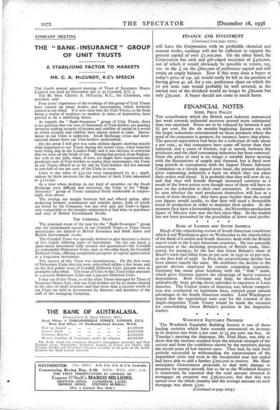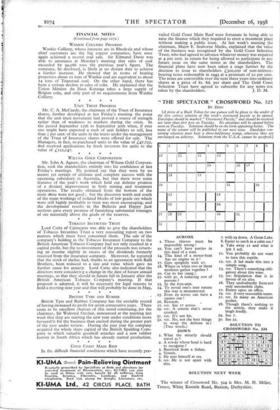FINANCIAL NOTES STEEL PRIC.E POLICY
THE contribution which the British steel industry announced last week towards industrial recovery proved more substantial than was expected. Prices are to be reduced by between 6 and 81 per cent, for the six months beginning January 1st, with the larger reductions concentrated on those products where the need of the consumer is greatest, for instance, heavy ship plates. The-general expectation had been for a reduction of only about 5 per cent., so that consumers have come off better than they expected, and a cause of friction, real or unreal, between the producers and the chief consuming industries has been removed. Since the price of steel is no longer a variable factor moving with the fluctuations of supply and demand, but is fixed over long periods in consultation with the Import Duties Advisory Committee on a closely argued costs basis, the present decision gives consuming industries a basis on which they can place their orders well ahead. It is probable that they will now do so, and that they will benefit through increased turnover as a result of the lower prices even though most of them will have to pass on the reduction to their own consumers. It remains to be seen whether the steel producers themselves will lose as a result of their decision ; they have gone further than the actual cost figures would justify, so that they will need a favourable trend of production in order to maintain their profits. At the moment they have a favourable trend; the November production figure of 86o,000 tons was the best since May. So the market has not been perturbed by the possibility of lower steel profits.
* * * *
BANK OF LONDON AND SOUTH AMERICA
Much of the stimulating review of South American conditions which Lord Wardington gave on Wednesday to the shareholders of the Bank of London and South America dealt with the British export trade to the Latin American countries. He was naturally concerned at the declining proportion of British trade illus-
trated, for instance, 1)3% the fact that Great Britain's trade, of Brazil's trade had fallen from 20 per cent. 111 1932 to 10 per cent. in the first half of 1938. In Peru the proportionate decline has been almost exactly the same. He attributes the decline to the special devices employed by certain competing countries. Germany has made great headway with the " Aski " mark, which gives German exports the advantage of heavy currency depreciation. Both Germany and Italy, he disclosed, had undoubtedly been giving direct subsidies to exporters to Latin America. 'The United states of America, too, whose competi- tion was conducted on legitimate lines, enjoyed great natural advantages in the South_ American market. Lord Wardington hoped that the negotiations next year for the renewal of the Anglo-Argentine Trade Treaty would be made the occasion for consolidating Great t Britain's position in the Argentine market.
* * * *
WOOLWICH EQUITABLE PROGRESS
The Woolwich Equitable Building Society is one of those leading societies which have recently announced an increase in its interest rate from 3 per cent. to 31 per cent, tax free. At Tuesday's meeting the chairman, Mr. Fred Hoar, was able to show that the increase resulted from the internal strength of the society and from the confidence shown by the members during the recent years of low interest rates. They had, he said, been entirely successful in withstanding the repercussions of the September crisis and even in the exceptional year just ended had been able to add a further L200,000 to reserve. Mr. Hoar anticipates Government proposals to deal with damage to property by enemy aircraft, but so far as the Woolwich Society is concerned, he reported that the total amount invested in mortgages on property was £36,000,00o, but that this was spread over the whole country and the average amount on each mortgage was about £520. (Continued on page 1074.) FINANCIAL NOTES (Continued from page 1072.)
WANICIE COLLIERY PROGRESS
Wankie Colliery, whose interests are in Rhodesia and whose chief customers are the big copper companies, have once again achieved a record coal sale. Sir Edmund Davis was able to announce at Monday's meeting that sales of coal exceeded by 99,086 tons the previous year's figure. The company, he disclosed, is likely at no distant date to achieve a further increase. He showed that in terms of heating properties about ii tons of Wankie coal are equivalent to about 74 tons of Transvaal coal. On the other hand, there has been a serious decline in sales of coke. He explained that the Union Miniere du Haut Katanga takes a large supply of Belgian coke, and only part of its requirements from Wankie Colliery.
UNIT TRUST PROGRESS
Mr. C. A. McCurdy, the chairman of the Trust of Insurance shares, further developed at last Friday's meeting the point that the unit trust movement had proved a source of strength rather than of weakness to markets during the crisis. In the period September 12th to September 3oth when, if ever one might have expected a rush of unit holders to sell, less than per cent. of the units in the trusts under the management of the Trust of Insurance shares were offered for sale. The Managers, in fact, re-purchased units to the value of £47,722, and received applications by fresh investors for units to the value of £112,047.
WLLUNA GOLD CORPORATION
Mr. John A. Agnew, the chairman of Wiluna Gold Corpora- tion, took the shareholders entirely into his confidence at last Friday's meetings. He pointed out that they were by no means yet certain of ultimate and complete success with the operating subsidiary in Australia, but that there were some features of the year's work which held out definite promise of a distinct improvement in both mining and treatment operations. The results obtained from the bottom of the main rAine were not good ; but the discovery north and south of the main workings of isolated blocks of low grade ore which were still highly profitable to treat was most encouraging, and the development results in the Bulletin and Happy Jack sections gave every promise of furnishing substantial tonnages of ore materially above the grade of the reserves.
TOBACCO SECURITIES TRUST
Lord Catto of Cairncatto was able to give the shareholders of Tobacco Securities Trust a very reassuring report on two matters which must have concerned them. The sale of the company's holding in the Tobacco Insurance Company to the British American Tobacco Company had not only resulted in a capital profit, but the re-investment of the proceeds was return- ing an income slightly in excess of the dividends formerly received from the insurance company. Moreover, he reported that the stock of shellac had, thanks to an agreement with Raffi Brothers, been reduced to a size and value which gave no further cause for anxiety. Lord Catto also indicated that the directors were considerir g a change in the date of future annual meetings, so that they should in future fall in January after the British American Tobacco Company's meeting. If that proposal is adopted, it will be necessary for legal reasons to hold a meeting next year and that will probably be done in May.
* *
BRITISH TYRE AND RUBBER t •
British Tyre and Rubber Company has the enviable record of having increased its profit for seven consecutive years. There seem to be excellent chances of this trend continuing, for the chairman, Sir Walrond Sinclair, announced at the meeting last week that they are starting the new year under conditions more favourable for the business than existed during the greater part of the year under review. During the past year the company acquired the whole share capital of the British Spalding Com- pany to which valuable goodwill attaches and a new rubber factory in South Africa which has already Started production.
GOLD COAST MAIN REEF
In the difficult financial conditions which have recently pre-. vailed Gold Coast Main Reef were fortunate in being able to raise the finance which they required to erect a treatment plant without making a public issue. At last week's meeting the chairman, Major E. Seaborne Marks, explained that the value of the business was recognised by the Gold Coast Selection Trust, who had agreed to advance whatever money was required at 4 per cent, in return for being allowed to participate in any future issue on the same terms as the shareholders. The financial plans have now been taken a stage further by the decision to issue to shareholders £3oo,000 of non-interest- bearing notes redeemable in 1943 at a premium of 20 per cent. The notes are convertible over the next three years into ordinary shares at a price of 8s. 6d. per share and The Gold Coast Selection Trust have agreed to subscribe for any notes not















































 Previous page
Previous page